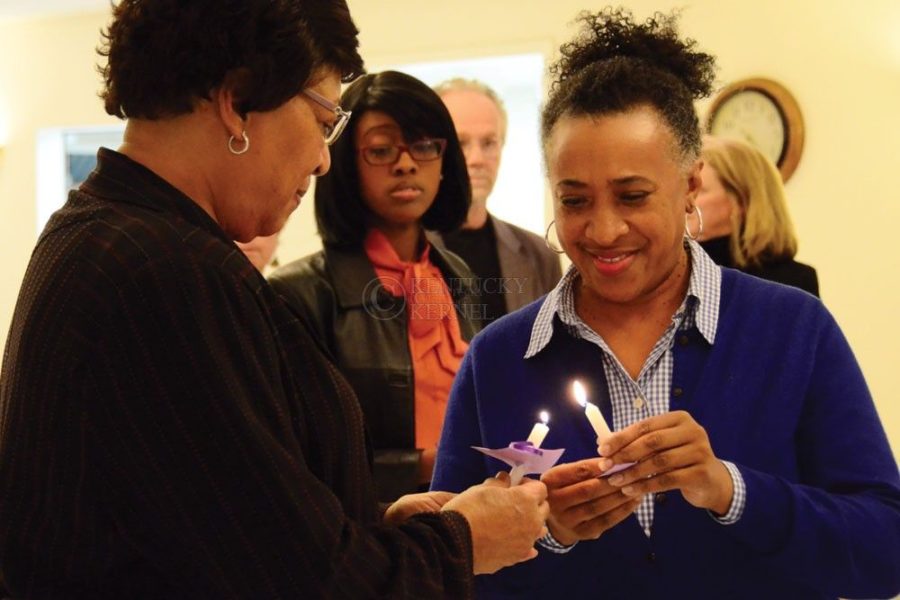Event recognizes Alzheimer’s sufferers
November 10, 2014
By Anne Halliwell
In a small hall at the rear of the Pilgrim Baptist Church, a flame was passed from candle to slim candle as a list of Alzheimer’s victims was read to about 20 community members, UK staff and students.
Every November, during the weekend of the 8th and 9th, communities light “candles of caring” through the Alzheimer’s Association to support and increase awareness for the victims of Alzheimer’s Disease, said Deborah Danner, the director of education and outreach at the Sanders-Brown Center’s Alzheimer’s Disease Center.
Psychology pre-med junior Sarah Smith, who planned the event, said she hoped the message that “you’re not alone” rang through to the listening crowd.
The clinical research assistant contributed a name to the list of victims — her great-grandmother, Naomi Mayfield, who had dementia when Smith was young.
With her grandmother’s recent acquisition of similar memory problems, which have not been diagnosed as Alzheimer’s, Smith said the ceremony dealt with some of her own concerns.
“I was too young to recognize (my great-grandmother’s symptoms), but now it’s like I’ve been given a second chance to recognize and to share about it,” Smith said.
Reverend Terry Cunningham II, a local pastor, read 15 names and a few short messages as the attendees bowed their heads over the candles.
As a member of the African-American Dementia Outreach Partnership, Cunningham meets quarterly with The Sanders-Brown Center on Aging and exchanges information on new research and ways to increase the ways for the center to present information to the community.
“We know that there (are) possibilities for life after the passing of a loved one,” Cunningham said. “We know that we all have to move on.”
Cunningham said he hoped that for those who attended to remember a loved one, the ceremony signified success in going on with their own lives while commemorating the other’s.
Danner said that when the center received funding 10 years ago to reach out to the African-American community in Lexington, they found that churches were the best way to share information.
“A lot of folks (come here) for coping,” Danner said. “It’s a family disease … because the caregiving can’t usually be taken on by one person.”
The center set up information about services offered on a nearby table.
“I really like this better (than holding the service at UK),” Danner said. “It seemed more comforting to those people who came.”
Jackie Cunningham, a clinical research assistant who graduated from UK in 2009 with degrees in psychology and vocal performance and currently attends the Asbury Theological Seminary, said her connection to the event was also a personal one.
“My grandmother was in a nursing home and had memory problems,” Jackie Cunningham said. “They didn’t have any social workers or psychologists … (so) they couldn’t give her the help that she needed.”
Community members like Beola Gill, 85, attended the ceremony to commemorate loved ones, to commiserate, or to learn about the Sanders-Brown Center’s services in preparation of their own mental decline or that of a family member.
“I’m turning 86 in February, I’m pretty well satisfied with myself,” Gill said. “(But) I’m concerned to learn, to know what it’s about.”
Gill said she attended the service to obtain information about information about memory issues that she could begin to experience, after seeing one friend who is “way younger than I am” in a nursing home with trouble remembering.
“It comes and it goes,” Gill said.

























































































































































